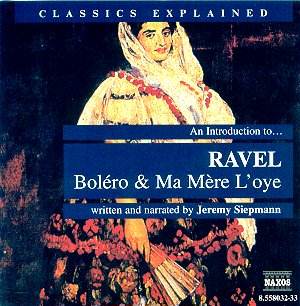CLASSICS EXPLAINED
RAVEL: Bolero & Ma Mère L'Oye
Jeremy Siepmann (narrator) and the Czecho-Slovak Radio Symphony Orchestra, Kenneth Jean
Issued 2001: date and place of recording not given.
NAXOS 8.558032-33 [97:38] (two discs)
Crotchet AmazonUK AmazonUS Amazon recommendations

This is one of the first issues in a Naxos series designed presumably to 'educate' the listener new to classical music. Jeremy Siepmann presents a minute analysis of the music, his commentary reproduced in a substantial booklet which also contains much background information, both general and particular. I have not heard the others in the series, but if this Ravel is a reasonably representative example, then I have my doubts. Particularly in the case of Bolero it seems to me that Siepmann has taken a very ponderous sledgehammer to crack a musical nut of slender proportions. The commentary runs to no fewer than 28 separate tracks: each elaborates some detail of structure or orchestration which is then illustrated in a performing extract. At the end of the commentary - which lasts twice as long as the actual piece - a complete hearing follows.
One is reluctant to 'knock' what is clearly a well-intentioned enterprise, but one cannot help wondering at whom it is targeted. I was immediately put off by Siepmann's first words - in which he contrives to work Elvis Presley into his narrative. And every time he uses a dynamic mark he solemnly translates it into English. Would a potential listener in need of such elementary information be likely to want this kind of extended commentary? In any case, Siepmann seems to undermine his own case by stating in a chapter entitled Ways of Listening: ' . . . directed listening can be a valuable, perhaps even an indispensable tool in the exploration of a masterpiece . . . but it can never rival the rewards of undirected, observational listening.' Quite so.
Having known this music all my life (and conducted Bolero on two occasions) I am probably not the right person to review this package. Perhaps the editor should search for an articulate musical 'beginner' to review future issues . . .
Performance and recording are adequate - certainly good enough for the purposes of this exercise, if not in the class of well-established recordings.
Adrian Smith